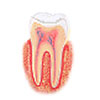Gum disease is an infection of the tissues and bones that surround and support the teeth. It is also called periodontal disease.
The two stages of gum disease are called gingivitis and periodontitis. Gingivitis is mild gum disease that affects only the gums, the tissue that surrounds the teeth.
Periodontitis is gum disease that gets worse and spreads below the gums to damage the tissues and bone that support the teeth.
Diagnosis:
Gingivitis causes red, swollen gums that bleed easily when the teeth are brushed. Because gingivitis usually doesn't cause pain, many people don't get the treatment they need. Sometimes gingivitis is an early symptom of gum disease.
 Periodontitis develops
if gum disease gets worse. The gums pull away from the teeth, leaving deep pockets where bacteria can grow and damage
the bone that supports the teeth. Gums can also shrink back from the teeth. This can make the teeth look longer.
Teeth may become loose, fall out, or have to be extracted.
Periodontitis develops
if gum disease gets worse. The gums pull away from the teeth, leaving deep pockets where bacteria can grow and damage
the bone that supports the teeth. Gums can also shrink back from the teeth. This can make the teeth look longer.
Teeth may become loose, fall out, or have to be extracted.
It may be hard to tell if you have a mild case of gum disease. Healthy gums are pink and firm, fit snugly around the teeth, and do not bleed easily. But mild cases of gum disease usually cause gums to become red, swollen and tender or bleed easily during brushing or flossing.
If you have gums that pull away or shrink from your teeth, pus coming from your gums, loose teeth, or you notice a change in how your teeth fit together when you bite, it may be a sign of progressing gum disease.
Treatment:
Dr. Hartigan or our dental hygienist may take X-rays of your teeth to look for bone damage and other problems.
If you have a mild case of gum disease, you will probably be able to take care of it by brushing and flossing your teeth every day and getting regular cleanings.
If your gum disease has become worse and you have periodontitis, our dental hygienist may clean your teeth using a method called root planing and scaling. This removes the plaque and tartar buildup both above and below the gum line. You may also need to take antibiotics to help get rid of the infection in your mouth.
Maintenance:
Gum disease is most common in adults, but it can affect anyone, even children. So good dental habits are important throughout your life. Some of the best ways to prevent gum disease is to maintain a good oral health care routine.
Brush your teeth at least 2 times a day, in the morning and before bedtime, with a fluoride toothpaste.
Floss your teeth at least once each day.
Visit us for regular checkups and teeth cleaning.
Do not use tobacco products.
If you think you have a mild case of gum disease, make sure to take care of it before it gets worse. Keeping your teeth and gums healthy and getting regular checkups can keep the disease from getting worse.
Also, having gum disease may increase a pregnant woman's risk of having a premature, low-birth-weight baby. Some studies have found a direct link between heart disease and the bacteria that cause gum disease. So taking good care of your teeth and gums may have benefits beyond keeping your mouth healthy.


